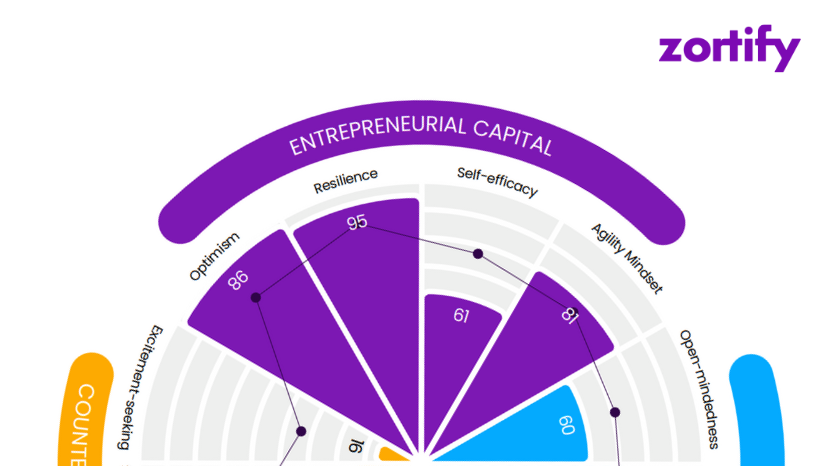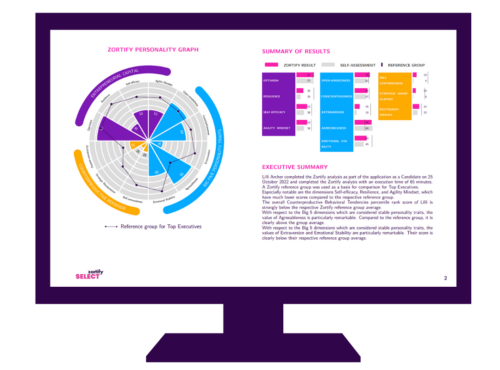How Companies Get to the Bottom of Quiet Quitting
The topic of “Quitting” is stirring the HR world. People seem to be resigning in very different ways. Sometimes very officially, increasingly internally, often silently. Yet, what does it say about our work environment when people who do what is expected of them (no less, but also no more) are referred to as “Quitters”? – However, we don’t want to become too philosophical here. The fact is: people feel less connected to their employers today than the generations before them. According to a recent study by EY, only 13% of respondents feel a strong bond to the company (for comparison: in 2017 it was still 34%). For companies, this is both a curse and a blessing at the same time.
The Facets of Quiet Quitting
Let’s start with “Quiet Quitting”. This includes the phenomenon where employees stay in the company, but emotionally and intellectually switch off. They only do the bare minimum and reduce their productivity, creativity, and interaction with colleagues to the required minimum. Not because they feel powerless and unmotivated, but quite consciously, to not let work take up too much space in their lives. Especially among young employees, this attitude was temporarily proclaimed a trend. But is this form of “Quitting” really a problem? – This requires a nuanced view: I think it is quite legitimate for an employee not to constantly go above and beyond the expected. Emotional distance from the company can also be healthy.
When Quiet Quitting Becomes a Problem
The problem arises when employees start to actively block processes and structures, both on formal and informal levels. For example, quite bluntly put, when informal conversations at the coffee machine are refused because they are not part of the employment contract. Such behavior can, if it affects more than just a few employees, lead to a toxic company culture. And can even bring organizations to a standstill. Not all processes can be formally defined. Informal approaches to tasks and challenges can facilitate and expedite work in many areas. Where this dynamic comes to a halt, work also becomes difficult for those who are actually enjoying their work. The risk of resignation increases, especially when there are sufficient job alternatives in the industry.
So, it can be concluded: Quiet Quitting as a conscious action becomes a problem when it blocks or downright poisons the informal and interpersonal in organizations, potentially making work less attractive for all employees.
Detecting and Addressing Silent Resignation
But there is also another form of silent resignation. One that does not come preventively, but as a reaction to the existing working conditions. I would like to refer to it here as “Inner Quitting”. Employees who do not feel seen, do not receive recognition, and do not see the value of their work reflected in tangible results or emotionally, eventually only do the absolute minimum, increasingly become numb and often fall far behind what they could and would achieve in a positive work environment. This form of quitting happens more subconsciously and is not targeted. However, the consequences for the atmosphere among the workforce can be similar to those of consciously working on a low flame.
Regardless of the reasons for the silent retreat. It is vital for companies to continuously detect and counteract such negative developments. For this, they need to find out how their employees are really doing – candidly and unfiltered.
Artificial Intelligence Provides True Employee Insights
Getting authentic insights into the emotions and motives of employees, especially those who feel little connection to the company, is challenging. Traditional, quantitative employee surveys often reach their limits as they can lead to standardized and thus potentially biased answers. Quiet Quitters are likely to hold back or distort their true feelings and thoughts in conventional surveys. Making it difficult to gain a genuine insight into their perspectives and experiences. Here, the use of AI and especially Large Language Model (LLM) technologies can make a significant difference.
LLM-based technology, used in the HR context, is capable of analyzing and evaluating qualitative answers – i.e., text responses – and identifying subtle hints and patterns in the expression of employees. This makes it possible to understand what is actually going on in the minds of the people in the organization. Which needs remain unmet, and where there may be toxic behaviors or structures that undermine employee satisfaction and loyalty. By combining quantitative and qualitative data enabled by AI analyses, companies can gain a deeper, nuanced perspective on the needs and challenges of their teams. And thus make better informed and targeted decisions to improve leadership and corporate culture.
Setting Employees on Default with AI
Conclusion: The multifaceted act of “Quitting” – whether visible and loud, quiet and strategic, or latently internal – reflects the urgency to listen to the desire for change on the part of many employees. This change must be initiated by the people in leadership positions. They have never been better positioned to do so than today. Because AI-based technology is a game changer, especially in HR work. Companies should be bold and loud in going forward and using the new possibilities when it comes to the most valuable thing they have: employees who by default want to do good work.
Quiet Thriving Over Quiet Quitting
AI’s Role in Fostering Proactive Work Culture. Every movement has its counter-movement, and this is also true in the HR sector. While “Quiet Quitting” describes a state in which employees do just the bare minimum, “Quiet Thriving” represents a concept that encourages people to actively participate and shape their own work environment.
Lead Effectively: Speak 20%, Actively Listen 80%!*
*(Spoiler: AI makes it possible)
Hand on heart: Do you know the current state of well-being of your employees? Do you understand their worries, challenges, and feelings? Do you know what truly moves them, what challenges they face, what is going well for them, and where they urgently need support?
Attention, narcissism!
Unveiling the truth about narcissism and its impact on teams and companies, discover how AI can now recognize such behavior. From charismatic allure to detrimental consequences, narcissists can disrupt success in various ways. Explore the prevalence of narcissistic traits in executive suites and the alarming trends among younger generations.
What is Entrepreneurial Capital that we measure at Zortify?
Entrepreneurial capital is like a secret weapon for business people, whether you are an entrepreneur, corporate employee or leader – you want to score high in entrepreneurial capital. It’s made up of certain mental powers that help you do well in your work and handle challenges bravely. It’s not about skills or personality traits, it’s about your mindset, how you think and deal with things.
Imagine having an invisible shield that helps you stay strong during hard times and makes running your business and lead your people smoother. That’s what entrepreneurial capital does. It helps you to not give up, believe in your ability, and always expect good things to happen.
The Wonderful Things About Having Entrepreneurial Capital
When a person has lots of entrepreneurial capital, they usually feel better, do their work happily, and achieve more because they can handle stress and problems effectively.
For a whole company, when everyone has high entrepreneurial capital, it leads to good performance all around, and it even earns more money for the company. In fact, high levels of entrepreneurial capital correlates positively with employee engagement, psychological wellbeing, performance, and authentic leadership. (Same research shows that low levels correlate with everything we want to avoid in business i.e., cynicism, high staff turnover, job-stress, anxiety, workplace deviance…)
Resilience: Bouncing Forward and Growing
Imagine a tree. When a storm comes, it bends in the wind. After the storm, it doesn’t just return to its previous shape; it grows even stronger and adapts to withstand future storms better. This is what resilience in the business world is like. It’s not only about coming back to where we were after facing challenges but also bouncing forward, learning, and growing from those experiences. When life throws difficulties our way, we use them as stepping stones to become even more robust and adaptive.
Optimism: The Sun Always Follows the Rain
Optimism signifies maintaining a positive outlook and persistently expecting favourable outcomes. Just like after every spell of rain, we anticipate the sun to shine again, an optimistic mindset in entrepreneurial capital embodies believing that after challenging or difficult periods, positive and prosperous times will follow. This faith in a brighter future drives our actions and decisions, it also makes us more courageous and risk-taking.
Self-Efficacy Conviction: Steering Our Own Ship
Self-efficacy conviction is similar to having an internal locus of control, where we believe that we have the steering wheel of our career journey in our hands. Imagine being the captain of a ship. Regardless of the turbulent seas or calm waters, it’s our belief in our ability to navigate through these varying conditions that defines our self-efficacy conviction. We see that our actions, decisions, and strategies significantly influence our career journey and achievements.
Agility Mindset: Dancing Through Dynamic Shifts
Envision a dancer, seamlessly flowing with the rhythm, effortlessly adapting to every beat change. An agility mindset in entrepreneurial capital mirrors this dancer, gracefully pivoting through the erratic beats of the business world, ensuring each unexpected move becomes a choreographed step towards success. With an agility mindset you embrace change, convert challenges into new opportunities, always staying in sync with the fluctuating markets and trends.
Developing Entrepreneurial Capital: Is it Possible?
Absolutely! Cultivating entrepreneurial capital is achievable by nurturing resilience, self-efficacy conviction, optimism, and an agility mindset, thereby enabling any individual to flourish. This is perfectly done through coaching, workshops, training and even meditation and self-reflection.
In conclusion, entrepreneurial capital is like a secret tool that helps us and our teams to do well in business. By focusing on growing our resilience, self-efficacy conviction, and optimism, not only do we become better entrepreneurs, but we also make our businesses stronger and more successful.
Unlock the Secret Weapon for Success!
Ready to harness this power for your success? Contact Sophia today to discover how Entrepreneurial Capital can elevate you and your company to new heights!
Sophia
Karlsson
Business Development & HX Consultant
From Quiet Quitting to Quiet Thriving
How AI promotes a proactive work culture
Every movement has its counter-movement. This is also the case in HR. While “Quiet Quitting” describes a state in which employees only do the bare minimum, “Quiet Thriving” is a concept that encourages people to actively and creatively participate in their work sphere.
A proactive counter-design
The idea behind this approach is that people have a fundamental need for joy, development and fulfillment in their work. This creates motivation to not just strive for the minimum, even in a working environment that is perceived as rather negative, but to take on a proactive role. Such an attitude contributes to mental health and makes it possible to positively shape the environment within one’s own capabilities.
Exploring the possibilities
The “Circle of Control, Influence and Concern“, a model from positive psychology, shows the different levels of influence and the resulting options for action. It illustrates very well that some things are within our control and others are not. Recognizing and differentiating between them paves the way to more (inner) freedom and enjoyment of our own actions, even under suboptimal conditions.
In relation to the work context, this essentially raises three questions:
- If I cannot control or influence my work environment, can I learn to accept it? (e.g. the behavior of my manager)
- If a problem in my work environment is not within my control, can I influence it so that I experience at least some enjoyment at work? (e.g. work routine)
- What is within my control? How can I gradually increase my scope of action in order to not only do the bare minimum, but to develop and contribute my own ideas out of an inner drive that pay into the company’s goals? Not out of obligation, but out of an authentic motivation that enhances me both personally and professionally?
In “Quiet Thriving”, employees consciously deal with their self-efficacy (however small it may be), proactively shape aspects that they can influence and adjust their attitudes and reactions with a look at the things that they cannot (initially) change. They also network with like-minded people and build a supportive community together in order to strengthen and utilize their collective self-efficacy.
Happier work thanks to AI
From an HR perspective, employees who perform monotonous tasks or tasks that are perceived as less meaningful are particularly prone to “quiet quitting”. Especially if they cannot see the immediate effect of their work and therefore do not feel valued. This is where HR can take targeted action and help shape the scope to promote “thriving”. One requirement for this is that HR employees recognize the emotional state of employees. Artificial intelligence (AI), which works with comprehensive language models (as we know them from ChatGPT), can help here. It determines how people in the organization are actually feeling by evaluating qualitative data (e.g. open text responses in a survey). Based on this data, HR can show demotivated and dissatisfied employees development and learning opportunities or enable a temporary transfer to another job.
For example, job rotations or further training can break established patterns, offer variety and provide new inspiration. Which development step is suitable for which employee can also be determined by the AI. It is important that these offers do not come as an additional burden “on top” and increase the employee’s workload, but represent a real alternative to the previous area of responsibility. A deep understanding of employees’ character traits, conditions and needs can also help to place the right people in the right roles within the organization at the right time and thus create optimal conditions for them to perform their tasks with motivation. Thanks to AI, HR has the opportunity for the first time to delve deep into the organization and unleash the full human potential that lies dormant within it.
Know your Privilege – and use it for the better.
It is important for me to emphasize that “Quiet Thriving” represents a privileged approach that is not applicable to all life and work situations. On the work side, it is particularly suitable for office jobs and industries in which skilled workers are scarce and employees have a certain amount of power. At the same time, the knowledge of the diverse nature of work experiences and environments should be an incentive for companies to make working life appreciative and fulfilling for as many people as possible. Emerging AI technology offers fascinating opportunities here. Let’s use them to leverage the creative potential that lies dormant in everyone.
Empowered teams: doing the right thing (instead of doing everything right)
What is more important on the job – doing things right or doing the right things? – Most people will probably answer “both”. Nevertheless, in the context of changing corporate cultures, it is worth thinking about this question in its absolute either-or variant.
Good leadership: With self-reflection and unsympathetic filter
A good leader – is that something you are or is that something you become? – Let me put it this way: you are one if you are willing to become one. In other words, leadership requires a willingness to develop. Leading always means learning to lead. It is an ongoing process that is never finished, especially in the fast-paced world we live in.
The self-made skills shortage
Why should we analyze applicants in depth if we have no choice about who we hire anyway? We hear this question a lot. It reflects the frustration many companies feel about the lack of skilled workers. And rightly so? – We say: Yes and no. For one thing, we think that the shortage of skilled workers is not a “force of nature” that companies are helplessly exposed to.
Founders are characterized by optimism, resilience and self-efficacy conviction. All values are measurable and trainable. Why is that?
Successful founders have strong personal resources. They are particularly optimistic, resilient and at the same time convinced of their own effectiveness. This entrepreneurial capital can be measured, and trained in every person.
Nurturing Entrepreneurial Capital in the face of uncertainty
Around one in ten of the working population in Germany is self-employed.[1] Crises such as the current Corona pandemic hit the self-employed particularly hard. Because they bear the full risk for their entrepreneurial activities. But even before Covid-19, it was true that anyone who wants to realize their own business idea in today’s volatile world needs psychological “capital” from which he or she can draw in difficult phases.
Self-employed people in particular often make risky decisions, work in a complex business environment and have to deal with an uncertain future. At the same time, in the best case, they consistently pursue their vision and also motivate their own employees. How do successful founders manage all this at the same time? The answer: with the help of their entrepreneurial capital, which they carry on their shoulders like an imaginary “resource backpack. This mental capital can be measured – and trained. An analysis offers an important starting point for making existing resources visible and expanding them.
The influence of entrepreneurial capital on business success can explain why relatively few people start up businesses in Germany, even though, according to the Global Entrepreneurship Monitor, many today consider themselves qualified enough and see opportunities to build up their own company. For the support and promotion of innovations and the start-up scene, therefore, the development of entrepreneurial capital is also an important adjusting screw.
What personality traits does entrepreneurial capital comprise?
Entrepreneurial capital forms the basic psychological framework for a successful and satisfied working life. It is based on the concept of “psychological capital,” which is increasingly in focus in psychological research, and comprises certain cognitive resources from which a person can draw to influence his or her own well-being.
These resources are more stable than emotions or moods but at the same time malleable and open to development. A high expression of the interacting resources is related to higher performance, job satisfaction, and psychological well-being. Conversely, individuals with low levels of psychological capital exhibit increased cynical behavior, job stress, and anxiety.
Current research shows that successful founders are particularly convinced of their own effectiveness, resilient as well as optimistic – and significantly higher than their own top managers. These three personality traits form the entrepreneurial capital of each person and, in their interplay, have a significant influence on professional success and job satisfaction:
Factor 1: Self-efficacy beliefs.
An unwieldy word with a strong impact. It refers to confidence in oneself and one’s own abilities to successfully complete tasks. People with a high level of self-efficacy set themselves ambitious goals and can control their own motivation. Even in difficult situations, they do not bury their heads in the imaginary sand. But try to master them as well as possible. Studies show that mastering challenging experiences and social persuasion promote the development of one’s own self-efficacy conviction.
Successful founders are convinced of their own effectiveness.
We know from our everyday life that a person’s actual competence and self-confidence do not always match. There are enough people who believe themselves to be less capable than they actually are – and vice versa. For founders as well as for employees, confidence in one’s own abilities is always an important resource. It helps not only in turbulent times, but also when leading a team or presenting one’s own ideas.
Factor 2: Personal resilience
Let’s imagine the following situation: A pandemic spreads worldwide and investors bail out. A worst-case scenario. However, unexpected events are not only part of building a business in pandemic times. As a rule, a start-up is always associated with a high degree of risk and uncertainty – failure and decisions with a bad outcome are often part of it. In addition, the responsibility increases the larger a start-up becomes. How do successful founders respond to such challenges?
Successful founders show a high level of resilience and deal calmly with unexpected events.
Successful founders show a high level of resilience: they accept reality as it is, tend to improvise, take risks and face challenges with openness. Those who are resilient get back up more quickly after setbacks and failures, cope better with conflicts and deal more calmly with uncertainties. Stumbling blocks? They are much less likely to throw resilient people off track. And if they do fail, they get back on their feet quickly and often recover at an even higher level of their personal self. People with high resilience focus either on their available resources, on the potential risks, or on the process itself, and aim their strategy at achieving the best possible outcome.
Factor 3: Optimistic attitude
Successful founders show a strong basic confidence in a positive future. They see and seize opportunities before others do and thus usually enter “error-prone” new territory. Optimists, however, tend to forgive themselves for mistakes more easily and to see opportunities even in the face of great uncertainty. Instead of being intimidated by possible failure, they believe in the success of their plans.
Looking on the Bright Side – successful founders are particularly optimistic.
What exactly makes an optimist “tick”? Research shows that they explain positive events with personal and lasting causes. In contrast, they attribute negative events to external, temporary and situation-specific causes. The world is perceived as a place where good things happen to you on a regular basis.
How can entrepreneurial capital be measured?
Zortify has developed a scientifically based test that uses artificial intelligence to evaluate a person’s entrepreneurial capital. The algorithm analyzes personality traits based on answers to self-assessment questions and freely formulated texts.
The special feature of AI-based text analysis is that it incorporates non-manipulable results into the evaluation, thus ensuring high validity of the test results. While the subjectivity of reviewers* cannot be completely ruled out, the use of AI technology enables objective and precise results to recognize and harness one’s own potential.
“Self-awareness is the most important cornerstone of emotional intelligence.” Daniel Goleman
What is the benefit of the analysis?
Knowledge about the individual characteristics of entrepreneurial capital provides an important basis for reflection and expands the options for action for guided personality development. The test results can be used to work out clearly defined topics in a coaching session. Previous research has shown that even one to three hours of highly focused microinterventions not only lead to a significant improvement of one’s own mental resources. But also to an increase in performance at one’s own workplace.
It is not only important for the self-employed and founders to invest in their entrepreneurial capital. The analysis provides a good basis for further training offers or decisions about financial support. For example, students with high entrepreneurial capital and a strong interest in entrepreneurship can be filtered and supported with a tailored educational program.
By fostering entrepreneurial capital, HR development can also help managers and employees* become more resilient, more optimistic about the future, and more confident in seeking alternative approaches in a volatile work environment. A transparent, supportive leadership style has an influence on the psychological capital of employees. And this, in turn, determines whether employees leave a company quickly or remain motivated in the long term.
Whether a founder, manager or employee – recognizing and promoting one’s own entrepreneurial capital helps people achieve their own goals and gives them the opportunity to adapt more easily, overcome difficulties and strengthen their mental well-being.
[1] Source: German Federal Statistical Office (Microcensus 2018)
Why should psychology be considered in due diligence?
When it comes to conducting due diligence, most people focus on analyzing financial statements, legal documents, and other technical information. However, it’s important not to overlook the role of psychology in due diligence. Here are some reasons why psychology should be considered when conducting due diligence.
Why Due Diligence matters: The importance of personality analysis in investment decisions
Due diligence is a crucial part of any investment decision, especially when it comes to startups. While financial, legal, and tax aspects are often thoroughly examined, there is one aspect that is sometimes overlooked: the personality of the founders.
What is Entrepreneurial Capital that we measure at Zortify?
Entrepreneurial capital is like a secret weapon for business people, whether you are an entrepreneur, corporate employee or leader – you want to score high in entrepreneurial capital. It’s made up of certain mental powers that help you do well in your work and handle challenges bravely. It’s not about skills or personality traits, it’s about your mindset, how you think and deal with things.
Why should psychology be considered in due diligence?
When it comes to conducting due diligence, most people focus on analyzing financial statements, legal documents, and other technical information. However, it’s important not to overlook the role of psychology in due diligence. Here are some reasons why psychology should be considered when conducting due diligence.
According to Oxford Languages, the definition of Due diligence in this matter is:. A comprehensive appraisal of a business undertaken by a prospective buyer, especially to establish its assets and liabilities and evaluate its commercial potential.
Understanding the Human Element
At its core, due diligence is about understanding the risks and opportunities associated with a potential investment. And when it comes to risks and opportunities, it’s important to consider the human element. Understanding the people involved in a potential investment, including their personalities, motivations, and decision-making processes; can provide valuable insights into the potential risks and opportunities associated with that investment.
For example, if a potential investment involves a CEO. Who has a history of making impulsive decisions or has a reputation for being difficult to work with. This could be a red flag that suggests additional risks that should be investigated further. Alternatively, if a potential investment involves a management team. That has a proven track record of successfully navigating difficult market conditions. This could be a positive sign that suggests that the investment may be less risky than it appears on the surface.
Assessing Cultural Fit
In addition to understanding the personalities and motivations of key individuals involved in a potential investment. It’s also important to consider the cultural fit between the investment and the investor. This includes not only the culture of the company or organization being invested in but also the culture of the investor.
For example, if an investor values social responsibility and environmental sustainability. They may be reluctant to invest in a company that has a history of violating environmental regulations or engaging in unethical business practices. Similarly, an investor who values transparency and open communication. He may be wary of investing in a company that has a history of being secretive or opaque about its operations.
By considering the cultural fit between the investment and the investor, due diligence can help to identify potential areas of misalignment that could ultimately lead to problems down the line.
Mitigating Bias and Emotion
Another reason why psychology is important in due diligence is that it can help to mitigate bias and emotion. When people make investment decisions, they are often influenced by a range of cognitive biases and emotions. Such as confirmation bias, overconfidence, and fear of missing out.
By incorporating a psychological perspective into the due diligence process, it’s possible to identify potential biases. As well as emotions that could affect judgment and develop strategies to mitigate them. This could involve conducting surveys or interviews to gain a better understanding of the emotional and cognitive factors that may influence decision making. Or decision making frameworks could be developed that aim to counteract common biases and emotional reactions.
Ensuring a Holistic Approach
Ultimately, the goal of due diligence is to ensure that all potential risks and opportunities associated with a potential investment are thoroughly assessed. By considering the role of psychology in due diligence, it’s possible to ensure a more holistic approach. That takes into account not only the technical aspects of the investment. But also the human and cultural factors that can influence the success or failure of an investment.
Conclusion
When conducting due diligence, it’s important not to overlook the role of psychology. By understanding the personalities, motivations, and decision-making processes of key individuals involved in a potential investment. As well as the cultural fit between the investment and the investor. Due diligence can help to identify potential risks and opportunities that might otherwise be missed. Additionally, by bringing a psychological perspective to due diligence, it’s possible to mitigate biases and emotions that may be clouding judgment. And to ensure a more holistic approach that takes into account all potential factors that can influence the success or failure of an investment.
Why Due Diligence matters: The importance of personality analysis in investment decisions
Due diligence is a crucial part of any investment decision, especially when it comes to startups. While financial, legal, and tax aspects are often thoroughly examined, there is one aspect that is sometimes overlooked: the personality of the founders.
“I can do it!”
Founders are characterized by optimism, resilience and self-efficacy conviction. All values are measurable and trainable. Why is that?
Successful founders have strong personal resources. They are particularly optimistic, resilient and at the same time convinced of their own effectiveness.
What is Entrepreneurial Capital that we measure at Zortify?
Entrepreneurial capital is like a secret weapon for business people, whether you are an entrepreneur, corporate employee or leader – you want to score high in entrepreneurial capital. It’s made up of certain mental powers that help you do well in your work and handle challenges bravely. It’s not about skills or personality traits, it’s about your mindset, how you think and deal with things.
Narcissism is widespread. Team and company success can be affected by narcissists in different ways.
Humorous, eloquent, self-confident – in short, a personality that magnetically attracts attention. You have certainly encountered such a person in your everyday professional life. Despite numerous positive effects that narcissistic persons can have on their environment, they are quickly noticed for their negative impact: The own advantage is in the foreground, bullying and harassment of colleagues are not uncommon, but also arrogant, inconsiderate and uncooperative behavior is often the order of the day.
Harvard Business manager 5/2021, Die Jungbullen kommen
Unveiling the Hidden Narcissists in Management
If you think about where you have encountered this person in your professional life, you will most likely find out that it was one or the other manager. This was also the conclusion of the study This was also the conclusion of the study we did together with Harvard Business manager and published it in their magazine in 05/2021, « Die Jungbullen kommen ». In addition to the survey of 9,918 study participants, 34 qualitative telephone interviews with exposed executives showed that many respondents had direct experience with narcissists in their own careers. Feel free to reach out to hello@zortify.com to receive the publication.
Narcissism has thus arrived in the executive ranks. Not only “old” men are the problem. Women also exhibit these traits. Comparing both sexes, it can be seen that men in all age groups have significantly higher narcissism scores on average than women.
The study also reveals a new trend that seems to confirm previous views. For example, young people whose age group is also referred to by Time magazine as the Me-Me-Me generation, i.e. women and men under 30, exhibit the strongest narcissistic tendencies in the study. Today’s socially valued values such as a high willingness to perform, self-expression, individual competition and striving for power characterize the younger generations in particular. Global competition and constant assessability through social media reinforce this effect.
Might be everywhere
Toxic narcissism at all levels – not just among managers – can have devastating effects on teams, their members and, in the long term, on companies. But the negative consequences don’t just affect financial aspects of an organization. In the following, we show what damage can be caused in companies and in teams by narcissists and how AI can help to identify narcissistic traits more quickly.
Narcissism is measurable: our NLP-based assessment analysis measures the characteristics that correlate positively, but also negatively with business success. The so-called counterproductive behavioral tendencies. Interested? Take a closer look here.
The negative consequences of narcissism for companies and teams
Narcissism is not yet widespread in the German population, the study also showed. On average, society in this country has moderate narcissism levels.
However, as soon as you change your perspective and focus on leadership and top positions, you will see a completely different picture. This is also reflected in the study. This fact is also addressed by a large number of scientific papers and articles in career magazines.
Narcissism is no longer an unknown phenomenon. However, the effects that narcissistic tendencies can trigger in teams are underestimated nowadays, even though they have long-term and negative consequences for companies.
When personal goals take precedence over corporate and team goals
The urge for recognition and attention repeatedly tempts narcissists to prioritize their own personal goals. The focus is on (short-term) success, a place in the limelight. This focus is also based on the fact that people with narcissistic tendencies find it difficult to respond to the needs of fellow human beings.
In the short term, narcissists can be successful with this behavior. But if colleagues and co-workers are not taken into consideration in the long term, the collateral damage at the team level is very high. The narcissist attributes successes of the team to him/herself. As soon as something goes wrong, however, the employees and colleagues are to blame. The interest revolves only around their own success. This has a negative impact on employee loyalty and satisfaction.
This misconduct also has long-term effects on the success of the company. Narcissists lose sight of what is important and take great risks. Key people can thus be disturbed in their own development. The company risks losing skilled employees.
If your colleague is a narcissistic leader, sooner or later the core elements of an organization will be affected. In an organization, people work together to accomplish something that cannot be accomplished alone. Narcissists undermine this cooperation. The effectiveness of an organization is reduced as a result. Decisions that are less fact-based and less oriented toward the success of the company, but rather toward quick personal success, mean in the worst-case high losses and revenue losses for the company.
Remote work: What happens when information is not passed on?
The behavior of narcissists to pursue only their own personal goals also has an impact on the way they work. Information may only be passed on to colleagues and team members who are useful in achieving one’s own goal. Important data and facts do not necessarily end up where they are needed. The remaining team members become unable to act because they need the information for further decisions and work steps.
A majority of German companies currently work with their employees in home offices. Remote work can be an optimal breeding ground for narcissistic managers. Depending on the constellation and workflow, they find it easier here to pass on information only in a targeted manner, to block the flow of information and to spin their intrigues. This can only be balanced out and prevented through good team communication and active exchange between colleagues.
Toxic Team Culture: When Narcissism Impedes Cooperation
Narcissists try to create an environment of yes-men, because it is easier for them to achieve their personal goals. Critical feedback providers are devalued, ignored – these people may only receive information under difficult conditions – and excluded. This also prevents a team from developing and growing. This leads to the aforementioned fluctuation of high potentials. The team culture is also directly affected.
Narcissistic people exert a direct influence on policies and practices that prevail in an organization. Conflict of interest guidelines, ethical behavior, teamwork – all are ignored. On the other hand, narcissistic leaders often fail to alert employees to misconduct that violates standard social norms – in some cases, this less collaborative behavior even receives recognition.
Because of such activities, further organizational damage occurs. It prevents teams from working together and makes it more difficult for them to achieve shared success. When employees are deprived of the opportunity to learn, grow and acquire new knowledge, their skills suffer. The morale and self-confidence of a team also suffer when a narcissistic leader claims collective successes for himself and blames failures on the employees. This creates a toxic team culture that can also have an economic impact on a company.
Deception and misinformation: When narcissists take it to the extreme.
If there is an intervening supervisor who can put a stop to your narcissistic leader with the help of company policies and control, you can breathe a sigh of relief. If the narcissist is higher up in the corporate hierarchy, he/she is automatically less vulnerable and can continue to enforce his/her misconduct.
Narcissistic facets such as delusions of grandeur would be a realistic option in companies led by a narcissist:in – combined with a high level of risk. This delusion could manifest itself, for example, in an aggressive and extremely reckless expansion strategy. The entrepreneurial consequences are devastating in case of failure.
You might also observe effects on the interpersonal level. Business partners who disagree or express too little praise are dropped and sent out the door with a scandal attached. The interests of employees are ignored and dismissed if they are displeased. If narcissistic persons are in a position that allows them to act freely, fraud and misinformation are a proven means of securing their own position of power and removing risk factors.
Detect narcissism faster with the help of AI.
If companies ignore this multitude of problems, they must expect high losses in several organizational areas. A study by McKinsey and Kienbaum concludes that up to 35 percent of hiring decisions are wrong. These costs alone can amount to three times the annual salary of the target position for a company.
In personnel selection procedures, attempts have been made for decades to identify such personalities (in good time) with personality tests in order to avoid organizational negative consequences. But these tests only examine the basic characteristics of a person. It is difficult to correlate these with entrepreneurial success. Since these tests rely on self-reporting by participants, they are susceptible to manipulation.
The limitations of traditional Personality Tests
With the help of Zortify and its artificial intelligence, it is not only possible to determine subclinical narcissistic character traits such as excessive self-confidence, striving for dominance or overestimating one’s own abilities. In addition to this, also the three dimensions of the dark triad (according to Delory Paulhus) – so called “Counterproductive Behavioral Tendencies” are measured: Self-centeredness, Impulsive Excitement-Seeking, and Strategic Manipulation.
Zortify: Unveiling the Dark Triad of Personality Traits
In this way, all characteristics are taken into account that can be detrimental to the company. Self-centeredness, Impulsive Excitement-Seeking, and Strategic Manipulation together make up the so-called “Counterproductive Behavioral Tendencies” here. In the context of the approach chosen by Zortify, Impulsive Excitement-Seeking is understood to be a personality tendency characterized by dissocial, antagonistic and insufficient behavior. Often caused by a lifestyle characterized by extremes.
A leader characterized in this way would, for example, relentlessly live out his or her career ambitions. Strategic Manipulation describes a scheming and ruthless pursuit of power. This behavior is detached from any moral and ethical principles. Employees at management level with a strong expression of this personality trait are prepared to forego consideration or ethical principles in favor of achieving or maintaining power. They will stop at nothing for their own advantage.
The Destructive Potential
The aforementioned character traits, coupled with unscrupulousness, are still decisive for professional and corporate success for many employees in today’s companies. The above-average manifestations of the characteristics of the dark triad are sometimes strongly represented among executives, but also in the entire leadership field. Counterproductive Behavioral Tendencies, however, are possessed by everyone.
Zortify algorithm trained with artificial intelligence incorporates insights from the analysis of the target’s written text into the assessment, which cannot be manipulated in the process. Decision-makers are thus enabled to make a better selection of candidates.
Protecting corporate success through the targeted use of AI
You will encounter personalities with narcissistic tendencies at all hierarchical levels in professional life. In the foreseeable future, this will become more and more common as younger generations exhibit high narcissism levels. The study also showed this.
If companies do not take measures in time, narcissists can cause many problems for their employees and skilled workers. In addition, a high level of organizational damage can also be expected.
In order to counteract these problems in time, narcissistic characteristics must be identified as quickly as possible. Zortify can support decision makers in this process, accelerate it and protect them from manipulation. So join our mission and let’s create an “asshole-free working environment”. Reach out to hello@zortify.com to learn more.
How Companies Get to the Bottom of Quiet Quitting
The topic of “Quitting” is stirring the HR world. People seem to be resigning in very different ways. Sometimes very officially, increasingly internally, often silently. Yet, what does it say about our work environment when people who do what is expected of them (no less, but also no more) are referred to as “Quitters”?
Quiet Thriving Over Quiet Quitting
AI’s Role in Fostering Proactive Work Culture. Every movement has its counter-movement, and this is also true in the HR sector. While “Quiet Quitting” describes a state in which employees do just the bare minimum, “Quiet Thriving” represents a concept that encourages people to actively participate and shape their own work environment.
Lead Effectively: Speak 20%, Actively Listen 80%!*
*(Spoiler: AI makes it possible)
Hand on heart: Do you know the current state of well-being of your employees? Do you understand their worries, challenges, and feelings? Do you know what truly moves them, what challenges they face, what is going well for them, and where they urgently need support?
Subscribe to Our Newsletter
Are you ready to shape the future of work and transform your HR strategies? – In our newsletter, we write about relevant topics between AI and HR and the fantastic new possibilities that artificial intelligence brings to modern People Management.















